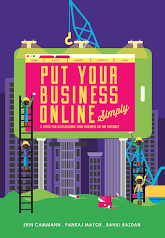Is Wordpress a Good Solution for Businesses? Take a closer look at the WordPress website building tool

Small business owners understand the importance of a solid web presence. Customers expect to find and purchase your products or services online, and to meet that demand, your website needs to be comprehensive and easy to use.
WordPress is the current giant of website building tools. The company started as a tool for bloggers and has morphed into a behemoth, powering massive and complex websites.
But is it the best tool for creating your small business website? Bigger doesn't always mean better, particularly where the needs of small businesses are concerned.
Yes, WordPress is a powerful tool, but it might be better-suited to developers with a firm background in technology. It turns out, building a website in WordPress can be a time-consuming and overwhelming process for the average person. While hiring a developer is an option, doing so can be expensive.
Before you make a decision on which website builder to use, let's take a closer look at the pros and cons of building a small business website using WordPress.
Pros
A world of WordPress website templates exist, which allows you to customize your website with as much detail as you'd like. Plus, the majority of these templates are optimized across browsers and for use on mobile devices. In terms of customizations for e-commerce sites, you'll be able to integrate external merchant account services, discount offerings, appointment schedulers, and messaging through third-party apps.
Support is offered via a blog, and questions are often answered by WordPress developers. The basic WordPress service is free, and more complex solutions -- including better templates and some third-party apps -- are available at a cost.
Cons
The sheer volume of templates can be overwhelming to someone without a background in website design, but if upgrades to the template are needed, the responsibility to implement them falls into your hands.
As we mentioned, all manner of e-commerce solutions are available through third-party vendors, which allows for flexibility, but also means that you will be responsible for integrating them into your website and updating the technology when necessary. If something should fail, you'll have to deal with the third-party vendor for service or answering questions.
Other necessary services only available through third-parties include website hosting, client management, sales tracking, and flexible security.
If incorporating third-party apps or services seems overwhelming, it's always possible to hire a developer to help integrate them and keep your site updated, but doing so can be very expensive.
The Solution
Rather than face the overwhelming responsibility of choosing a design, building a site from scratch, and incorporating third-party e-commerce and hosting solutions, small business owners can opt to use a website building platform like Ocoos.
Because Ocoos is a platform, all aspects of the underlying technology -- including design, hosting, and e-commerce solutions -- are streamlined, updated and supported behind the scenes, without the small business owner ever having to lift a finger.
This means your business website will always be optimized across hand-held devices, search engines, and browsers. Plus, as technology shifts and updates, so will Ocoos's underlying technology.
You'll have access to e-commerce tools like appointment schedulers, an interactive calendar, maps and messaging on the platform. A patented B2B recommendations engine will even help connect your website to those of partner businesses (a restaurant and a laundry service, for instance), driving traffic to both.
Finally, not only is 24-hour support available, the Ocoos platform also has a concierge service, for a fee, which will build and maintain your website.


